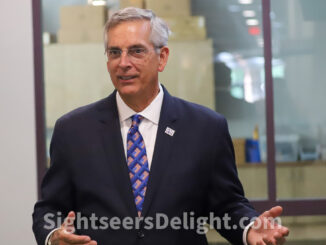Often times, dreamers are high on ideas but short on results. That was not true of Martin Luther King, Jr., who had perhaps the most famous dream in the history of our great nation. He was a man of God, and he was a man of action. He inspired a nation through both his words and his walk, while donning the garments of non-violence and justice in place of a weapon. As we celebrate his legacy, we must admire the audacity of a man who risked and ultimately lost his life, because he would rather sacrifice it, than sacrifice his dream.
Dr. King deserves all the praise and honor that is afforded him in ceremonies like this one which take place each year around the nation. But I think more than just saying kind thoughts about him, we ought to take action ourselves. This is how we imbed truth into our words.
I think it’s time for Georgia’s leaders to follow in Dr. King’s footsteps and take action too. Not many states can boast a native son who has merited a national holiday. But we Georgians can. Dr. King lived during a time when the law required discrimination against some of our citizens. That’s why, working with the General Assembly in this 2014 session, I’m committed to finding an appropriate way to honor Dr. King on Capitol Hill.
We can also honor Dr. King by passing just laws that lift up the human spirit. When I took office, we saw too many exiting our prisons only to return to a life of crime. This is why for the past three years I have focused on rehabilitating those who are in prison, rather than leaving them locked up to become more dangerous criminals. In 2012 and 2013, we worked to make use of drug courts, mental health courts and other community-based measures to keep more of our state’s nonviolent citizens and youth out of our jails and into places where they can find help and get a hold of their lives. We have already seen some results, but we must ensure our reforms can last.
For this reason, we have begun the third phase of our reforms this year, and this one will prove crucial to the success of the others. For those men and women who leave our prisons changed, bearing a renewed vigor for an honest life, we see in them a sense of hope that has not existed in the past. We cannot allow that spark to become extinguished through lack of opportunity; it is in despair that visions become blurred and what is wrong may seem right. It is through providing a pathway to a law-abiding, taxpaying future that we correct their vision. We must give our rehabilitated offenders a real chance to get job skills and a fighting chance to gain employment, because right now stigma and prejudice have removed that opportunity.
As such, we want to even the playing field when it comes to getting a job, by putting in such measures as helping those released offenders find housing, and we want to give them a right to an in-person interview rather than rejection by resume. In many state agencies, where appropriate, we will give these job applicants time to explain their past, whereas most would normally be eliminated from the hiring process before ever getting that chance. We hope the private sector will follow suit to make our third phase, and thus all our reforms, as successful as possible. As Dr. King once said, “Life’s most persistent and urgent question is, ‘What are you doing for others?’”
These reforms aren’t just good for former inmates and their families. It’s good for everyone in this beautiful church, everyone in this city, everyone in this state. We are not only saving lives, we are also saving tax dollars.
Dr. King knew about banding together to change lives for the better. He said, “I have a dream this afternoon that the brotherhood of man will become a reality in this day. And with this faith I will go out and carve a tunnel of hope through the mountain of despair. With this faith, I will go out with you and transform dark yesterdays into bright tomorrows.”
Now, I want to stress that this will require determination on the part of those released. They will have to work hard and stay clean. The reforms aren’t a handout. They help those who help themselves. And I have seen the liberating power of a job for men and women who know what it feels like to lose freedom.
While the first two criminal justice reforms are primarily the work and responsibility of state and local governments, this third leg will require the private sector, including those in our religious community, to play a much larger role. It is in that respect that I ask for your help to make our current efforts go smoothly.
Dr. King said, “The time is always right to do what’s right.” … Well, I think we’re doing what’s right. I appreciate your partnership in this quest for justice, and I appreciate the chance today to celebrate the life and legacy of a proud son of Georgia, who stands tall as one of the greatest Americans to ever live.
Nathan Deal is governor of Georgia. The above remarks are as prepared for the MLK Annual Commemorative Service.




